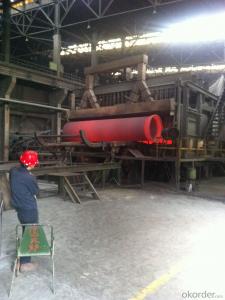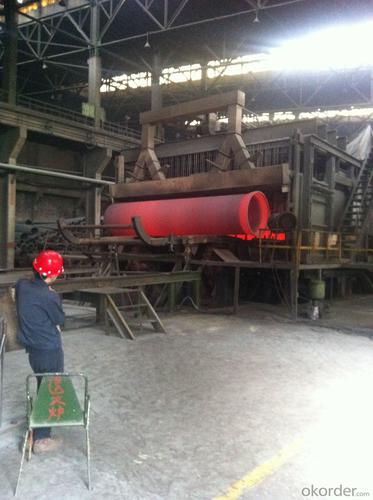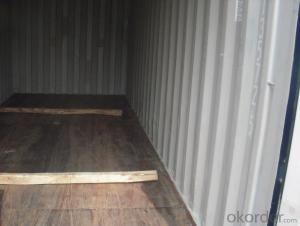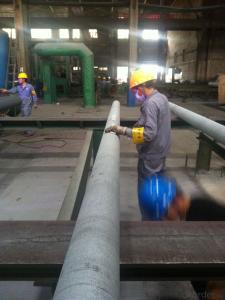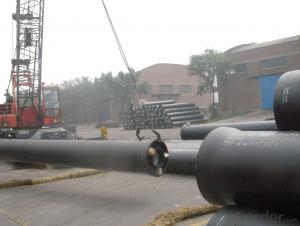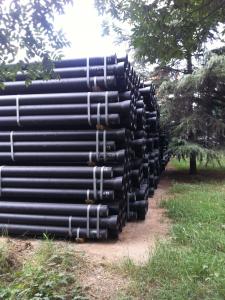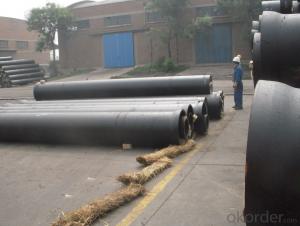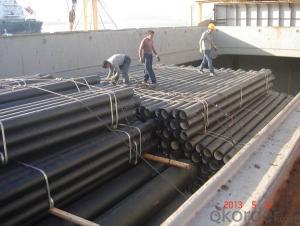DUCTILE IRON PIPE AND PIPE FITTINGS K7 CLASS DN1000
- Loading Port:
- Tianjin
- Payment Terms:
- TT OR LC
- Min Order Qty:
- 23 pc
- Supply Capability:
- 3000 pc/month
OKorder Service Pledge
OKorder Financial Service
You Might Also Like
· Material : Ductile Cast Iron
· Size Range : DN 80mm to DN 2000mm
· Unit Effective Length : 6m or 5.7m
· Manufacture Standard: ISO 2531:1998/ EN 545:2006/EN 598:2007
· Annual capacity : 200,000 tons
· Coating Exterior: Zinc 130g/m2 according to ISO 8179-1 and bitumen coating 70 microns.
· Cement Interior: Portland Cement/ High Alumina Cement/ Sulphate Resisting Cement Lining according to ISO 4179
· Special requirements on external coating and internal lining can be applied
· We also provide accessories such as SBR/EPDM rubber gaskets, lubricant paste, pipe caps, PE sleeves, etc.
Additional Parts:
Each pipe is strictly inspected according to related standard to ensure permanently high performance.
Easy Installation at site and service free for life
Long Service Lifespan
Quotation will arrive you within 24hours once we get your inquiry.
We guarantee offering you a competitive price.
A copy of original inspection reports of pipes will be offered after shipment.
Photos of loading process will be sent to the customer after shipment effect.
We will follow-up the delivery progress after shipment effect and update to the customer on weekly basis.
- Q: What is the maximum operating pressure for ductile iron pipes?
- The maximum operating pressure for ductile iron pipes typically ranges from 350 to 500 psi, depending on the specific diameter and class of the pipe.
- Q: What material is the cutting tool for ductile iron?
- The tool manufacturers so much, such as: Santak, Kenna, widia, Dai Jie, Walter, MITSUBISHI, Toshiba, ISCA, TaeguTec, Zhuzhou, each of the grades are not the same. But according to your specific processing workpiece and processing time and precision requirements, can choose the most suitable tool.
- Q: What are the typical installation methods for ductile iron pipe?
- The typical installation methods for ductile iron pipe involve several steps to ensure proper installation and functionality. Firstly, the trench is excavated to the required depth and width, accounting for the pipe diameter and bedding material. The bottom of the trench is then carefully prepared by removing any sharp objects or debris that could potentially damage the pipe. Next, a layer of suitable bedding material such as sand or fine gravel is placed evenly along the bottom of the trench to provide support and prevent any point loading on the pipe. The bedding material is compacted to ensure stability and eliminate any voids that could cause the pipe to settle or shift over time. After the bedding is in place, the ductile iron pipe is carefully lowered into the trench, taking precautions to prevent any damage to the pipe's protective coating. The pipes are then aligned and supported at regular intervals using appropriate pipe supports or blocks. Once the pipe is properly aligned, the joints are assembled by applying a lubricant and inserting a rubber gasket into the bell end of the pipe. The spigot end of the adjacent pipe is then inserted into the bell end, creating a secure and watertight seal. After the joints are assembled, the backfilling process begins. Backfill material, typically a combination of native soil and select backfill, is carefully placed around the pipe in layers and compacted to provide stability and prevent any voids. The backfilling process is carried out gradually, allowing for proper compaction and avoiding excessive pressure or damage to the pipe. Finally, the trench is fully backfilled and compacted, ensuring that the pipe is adequately supported and protected from external forces. Surface restoration is then performed to restore the area to its original condition, minimizing any disruption caused by the installation process. It is important to note that these installation methods may vary depending on project specifications, local regulations, and engineering recommendations. Therefore, it is essential to consult the manufacturer's guidelines and work closely with qualified professionals to ensure proper installation of ductile iron pipe.
- Q: The benefits of ductile iron castings
- Nodular cast iron, is a kind of high strength cast iron material developed in 50s twentieth Century, its comprehensive performance is close to the steel, it is based on its excellent performance, has been successfully used in casting complex stress, strength, toughness and wear resistance requirements of the higher parts.
- Q: How does ductile iron pipe perform in areas with high groundwater levels?
- Ductile iron pipe proves to be highly effective in areas characterized by elevated groundwater levels. A notable advantage of this type of pipe lies in its resistance to corrosion, rendering it particularly suitable for underground applications and areas with high water tables. Unlike alternative materials, ductile iron pipe remains impervious to rust or corrosion caused by groundwater, ensuring its longevity and durability. Moreover, ductile iron pipe is distinguished by its exceptional strength and flexibility, enabling it to withstand the external pressure exerted by high groundwater levels. It effectively resists the buoyant forces exerted by water, thereby preventing any displacement or flotation. Furthermore, the joints of ductile iron pipe are tightly sealed, thus preventing any infiltration of groundwater into the pipe system. This guarantees the absence of leaks or water supply contamination, which is of utmost importance in areas with high groundwater levels. All in all, ductile iron pipe emerges as the optimal choice for areas with high groundwater levels due to its corrosion resistance, strength, and ability to maintain a secure and tightly sealed system. It provides a dependable and long-lasting solution for water distribution and sewer systems, even in challenging environments.
- Q: Can ductile iron pipes be used for underground compressed air systems?
- Underground compressed air systems can utilize ductile iron pipes due to their high strength and durability. These pipes are suitable for various applications, including underground installations, thanks to their corrosion resistance. This is especially important in underground systems where moisture and other environmental factors can cause damage over time. Moreover, ductile iron pipes have the capability to withstand high pressure, making them a dependable choice for compressed air systems. However, it is crucial to ensure proper installation of the pipes, including adequate support and protection, to prevent any damage or leaks. To maintain the longevity and efficiency of the underground compressed air system, regular maintenance and inspection should also be carried out.
- Q: Can ductile iron pipe be used for irrigation pumping stations?
- Yes, ductile iron pipe can be used for irrigation pumping stations. Ductile iron pipe is known for its durability, corrosion resistance, and ability to withstand high pressure and flow rates. It is a commonly used material for water supply systems, including irrigation pumping stations, due to its reliability and long service life.
- Q: How can stainless steel pipes and ductile iron pipes be joined?
- The utility model can be connected with a wide range flange joint or a wide range flexible joint
- Q: What is the average weight of ductile iron pipe?
- The average weight of ductile iron pipe varies depending on the size and thickness of the pipe. However, on average, ductile iron pipes can weigh between 300 to 600 pounds per linear foot.
- Q: Are ductile iron pipes suitable for use in residential plumbing?
- Yes, ductile iron pipes are suitable for use in residential plumbing. Ductile iron is a strong and durable material that is resistant to corrosion, making it ideal for plumbing systems. It has a high tensile strength, which means it can withstand high pressure and is less likely to crack or break compared to other materials. Ductile iron pipes are also known for their long lifespan, lasting up to 100 years or more, making them a reliable choice for residential plumbing systems. Additionally, ductile iron pipes have excellent flow characteristics, allowing for efficient water distribution throughout the home. Overall, the strength, durability, and corrosion resistance of ductile iron pipes make them a suitable and long-lasting option for residential plumbing.
Send your message to us
DUCTILE IRON PIPE AND PIPE FITTINGS K7 CLASS DN1000
- Loading Port:
- Tianjin
- Payment Terms:
- TT OR LC
- Min Order Qty:
- 23 pc
- Supply Capability:
- 3000 pc/month
OKorder Service Pledge
OKorder Financial Service
Similar products
Hot products
Hot Searches
Related keywords
